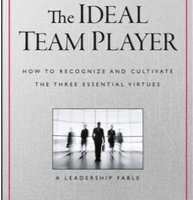The Ideal Team Player by Patrick Lencioni

At staff retreat this year, Chris Pine introduced us to Patrick Lencioni’s The Ideal Team Player. I must admit I was a little annoyed at first; I have read, enjoyed and found helpful other Lencioni books such as, The Five Dysfunctions of a Team, Death by Meeting and Getting Naked. I’ve been on the lookout for anything new but obviously my Lencioni ‘radar’ obviously has a glitch as The Ideal Team Player came out in 2016.
Each book by Lencioni follows a two-part structure of an extended ‘parable’ that tells a story where the principles are ‘lived out’ and a section where those principles are distilled and explained. The Ideal Team Player is no different.
Essentially, it all comes down to this diagram:

The ideal team player possesses three virtues, they are: Humble, Hungry and Smart.
Humble, because they are quick to praise others contributions; easily admit mistakes and are willing to do ‘grunt work’ for the team.
Hungry, describes those who do more than is required in their own job and have a passion for the ‘mission’ of the team
Smart is a description of people who understand how they and others work and use that to the team’s advantage and they demonstrate an interest in the lives of their teammates.
The power of the diagram is in the next two levels of analysis. Those who have only one of the three characteristics are identified as: The Charmer (Smart); The Bulldozer (Hungry) and The Pawn (Humble) or those who have only two of the three characteristics: The Skilful Politician (Smart & Hungry); The Accidental Mess-Maker (Hungry & Humble) and The Loveable Slacker (Humble & Smart).
The book is more than a diagnosis of what might be wrong, it describes how to develop a team culture where these three ‘virtues’ become ingrained and how to develop these aspects of team culture in individuals who are lacking a ‘virtue’.
At our staff retreat we completed the free on-line Self-assessment exercise[1] before breaking into groups of people with the same weakness. We spent fifteen minutes discussing how we might improve in that area. More than anything else, this process made me very aware of how I might behave in the future.
So, how might this work in our churches? Fairly easily I would think, whether we have a staff, or only a Session/Committee of Management and ministry leaders. Developing a culture that is Humble, Hungry for growing God’s people in Christian character and number, as well as Smart when it comes to persons and groups, is a given. I would add one more virtue for Christian leaders, the ability to telling the message of the God’s plan in Christ well.
The Ideal Team Player is a book worth getting and using in your church to help you think about developing a healthy church culture.
Dave
Thurston
[1] https://www.tablegroup.com/imo/media/doc/IdealTeamPlayerSelfAsssesment(11)NEW.pdf

